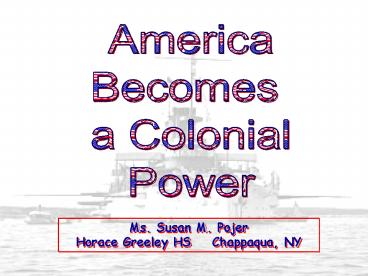America Becomes A Colonial Power - PowerPoint PPT Presentation
1 / 56
Title:
America Becomes A Colonial Power
Description:
Title: America Becomes A Colonial Power Author: Susan M. Pojer Last modified by: Jerry L. Eagan Created Date: 2/25/2005 2:45:16 AM Document presentation format – PowerPoint PPT presentation
Number of Views:182
Avg rating:3.0/5.0
Title: America Becomes A Colonial Power
1
America Becomes a Colonial Power
Ms. Susan M. PojerHorace Greeley HS
Chappaqua, NY
2
Essential Question Why did America join the
imperialist club at the end of the 19c?
3
1. Commercial/Business Interests
U. S. Foreign Investments 1869-1908
4
1. Commercial/Business Interests
American Foreign Trade1870-1914
5
2. Military/Strategic Interests
Alfred T. Mahan ? The Influence of Sea Power on
History 1660-1783
6
3. Social Darwinist Thinking
The White MansBurden
The Hierarchyof Race
7
4. Religious/Missionary Interests
American Missionariesin China, 1905
8
5. Closing the American Frontier
9
Hawaii "Crossroads of the Pacific"
10
U. S. Missionaries in Hawaii
Imiola Church first built in the late 1820s
11
U. S. View of Hawaiians
Hawaii becomes a U. S. Protectorate in 1849
by virtue of economic treaties.
12
Hawaiian Queen Liliuokalani
Hawaii for the Hawaiians!
13
U. S. Business Interests In Hawaii
- 1893 Americanbusinessmen backed anuprising
against Queen Liliuokalani. - Sanford Ballard Dole proclaims the Republic of
Hawaii in 1894.
14
To The Victor Belongs the Spoils
Hawaiian Annexation Ceremony, 1898
15
China
16
The Boxer Rebellion 1900
- The Peaceful Harmonious Fists.
- 55 Days at Peking.
17
The Open Door Policy
- Secretary John Hay.
- Give all nations equalaccess to trade in China.
- Guaranteed that China would NOT be taken over by
any one foreign power.
18
TheOpen Door Policy
19
America as a Pacific Power
20
Japan
21
Commodore Matthew Perry Opens Up Japan 1853
The Japanese View of Commodore Perry
22
Treaty of Kanagawa 1854
23
Lodge Corollary to the Monroe Doctrine 1912
- Senator Henry CabotLodge, Sr. (R-MA)
- Non-European powers,like Japan, would
beexcluded from owningterritory in the
WesternHemisphere.
24
Cuba
25
The Imperialist Tailor
26
Spanish Misrule in Cuba
27
Valeriano Weylers Reconcentration Policy
28
Yellow Journalism Jingoism
Joseph Pulitzer
Hearst to Frederick Remington You furnish
the pictures, and Ill furnish the war!
William Randolph Hearst
29
De Lôme Letter
- Dupuy de Lôme, SpanishAmbassador to the U.S.
- Criticized PresidentMcKinley as weak and
abidder for the admirationof the crowd,
besidesbeing a would-be politicianwho tries to
leave a dooropen behind himself whilekeeping on
good termswith the jingoes of hisparty.
30
Theodore Roosevelt
- Assistant Secretary of the Navy in the McKinley
administration. - Imperialist and American nationalist.
- Criticized PresidentMcKinley as having the
backbone of a chocolate éclair! - Resigns his position to fight in Cuba.
31
The Rough Riders
32
Remember the Maineand to Hell with Spain!
Funeral for Maine victims in Havana
33
The Spanish-American War (1898)That Splendid
Little War
34
Attack on the Spanish Navy
35
Dewey Captures Manila!
36
Our Sphere of Influence
37
The Treaty of Paris 1898
- Cuba was freed from Spanish rule.
- Spain gave up Puerto Rico and the island ofGuam.
- The U. S. paid Spain20 mil. for
thePhilippines. - The U. S. becomesan imperial power!
38
The American Anti-Imperialist
League
- Founded in 1899.
- Mark Twain, Andrew Carnegie, WilliamJames, and
WilliamJennings Bryan amongthe leaders. - Campaigned against the annexation of
thePhilippines and otheracts of imperialism.
39
Cuban Independence?
- Teller Amendment (1898)
- Platt Amendment (1903)
- Cuba was not to enter into any agreements with
foreign powers that would endanger its
independence. - The U.S. could intervene in Cuban affairs if
necessary to maintain an efficient, independent
govt. - Cuba must lease Guantanamo Bay to the U.S. for
naval and coaling station. - Cuba must not build up an excessive public debt.
Senator Orville Platt
40
Panama
41
Panama Canal
TR in Panama(Construction begins in 1904)
42
The Roosevelt Corollary to the Monroe Doctrine
1905
Chronic wrongdoing may in America, as elsewhere,
ultimately require intervention by some civilized
nation, and in the Western Hemisphere the
adherence of the United States to the Monroe
Doctrine may force the United States, however
reluctantly, in flagrant cases of such wrongdoing
or impotence, to the exercise of an international
police power .
43
Speak Softly,But Carry a Big Stick!
44
America's New Role
45
The Cares of a Growing Family
46
Constable of the World
47
Treaty of Portsmouth 1905
Nobel Peace Prize for Teddy (Russo-Japanese War)
48
The Great White Fleet 1907
49
Tafts Dollar Diplomacy
- Improve financialopportunities for American
businesses. - Use private capital tofurther U. S.
interestsoverseas. - Therefore, the U.S. should create stability and
order abroad that would best promote Americas
commercial interests.
50
Mexico
51
The Mexican Revolution 1910s
Emiliano Zapata
Pancho Villa
Venustiano Carranza
Porfirio Diaz
Francisco I Madero
52
Wilsons Moral Diplomacy
- The U. S. shouldbe the conscienceof the world.
- Spread democracy.
- Promote peace.
- Condemn colonialism.
53
Searching for Banditos
General John J. Pershing with PanchoVilla in
1914.
54
U. S. Global Investments Investments in Latin
America, 1914
55
U. S. Interventions in Latin America 1898-1920s
56
Uncle Sam One of the Boys?































